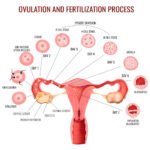
Unexplained Infertility? Here Are A Few Reasons Why You May Be Unable To Conceive
December 12, 2024
What is Ovulation, and How Does it Affect Fertility?
December 25, 2024Pregnancy is an incredible journey filled with excitement and anticipation. However, it also brings about significant physical and emotional changes that can lead to discomfort. While every pregnancy is unique, some symptoms are commonly experienced by many expecting mothers. Understanding the causes of these symptoms and learning how to manage them can make the journey smoother and more enjoyable.
1. Morning Sickness
Causes
Morning sickness, characterized by nausea and vomiting, often occurs in the first trimester due to hormonal changes, particularly an increase in human chorionic gonadotropin (hCG) and estrogen levels.
Tips to Manage
- Eat small, frequent meals to avoid an empty stomach.
- Avoid strong odors and foods that trigger nausea.
- Stay hydrated by sipping water or ginger tea.
- Consider acupressure wristbands or vitamin B6 supplements (consult your doctor first).
2. Fatigue
Causes
Pregnancy fatigue is often linked to hormonal changes, especially increased progesterone levels. It may also result from physical demands on the body and anemia.
Tips to Manage
- Get plenty of rest and take naps when needed.
- Maintain a balanced diet rich in iron and protein.
- Stay active with light exercises like walking or prenatal yoga.
- Discuss persistent fatigue with your healthcare provider to rule out anemia or thyroid issues.
3. Heartburn and Indigestion
Causes
Hormonal changes relax the esophageal sphincter, allowing stomach acid to flow back into the esophagus. The growing uterus also exerts pressure on the stomach, exacerbating the problem.
Tips to Manage
- Eat smaller meals and avoid spicy, greasy, or acidic foods.
- Don’t lie down immediately after eating; wait at least 2-3 hours.
- Sleep with your upper body slightly elevated.
- Ask your doctor about safe antacids if symptoms persist.
4. Constipation
Causes
Progesterone slows down digestion, and the growing uterus puts pressure on the intestines, leading to constipation.
Tips to Manage
- Increase fiber intake with fruits, vegetables, and whole grains.
- Stay hydrated by drinking plenty of water.
- Engage in regular physical activity to stimulate digestion.
- Avoid iron supplements unless prescribed by your doctor.
5. Back Pain
Causes
The added weight of pregnancy shifts your center of gravity, straining back muscles. Hormonal changes also loosen ligaments and joints, contributing to discomfort.
Tips to Manage
- Practice good posture and avoid standing or sitting for long periods.
- Use supportive shoes and avoid high heels.
- Consider using a maternity belt for additional support.
- Try prenatal massage or apply warm compresses to alleviate pain.
6. Swelling (Edema)
Causes
Increased blood volume and fluid retention can cause swelling in the feet, ankles, and hands, particularly in the third trimester.
Tips to Manage
- Elevate your feet whenever possible.
- Avoid standing for extended periods.
- Wear comfortable, supportive shoes.
- Stay hydrated and reduce salt intake.
- Contact your doctor if swelling is sudden or severe, as it may indicate preeclampsia.
7. Leg Cramps
Causes
Leg cramps during pregnancy may result from increased weight, changes in circulation, or a deficiency in magnesium or calcium.
Tips to Manage
- Stretch your calf muscles before bed.
- Stay hydrated and include magnesium- and calcium-rich foods in your diet.
- Use a heating pad or massage the affected area to relieve cramps.
- Discuss persistent cramps with your doctor.
8. Frequent Urination
Causes
Hormonal changes increase blood flow to the kidneys, and the growing uterus exerts pressure on the bladder.
Tips to Manage
- Avoid caffeine, which can increase urination.
- Empty your bladder completely by leaning forward when urinating.
- Stay hydrated but reduce fluid intake before bedtime.
- Practice Kegel exercises to strengthen pelvic floor muscles.
9. Mood Swings
Causes
Fluctuating hormone levels, physical discomfort, and anxiety about the future contribute to emotional ups and downs.
Tips to Manage
- Practice relaxation techniques like deep breathing, meditation, or prenatal yoga.
- Share your feelings with loved ones or join a support group.
- Maintain a healthy diet and get adequate sleep.
- Seek professional help if mood swings are severe or persistent.
10. Stretch Marks
Causes
Rapid weight gain and stretching of the skin can lead to stretch marks, especially on the abdomen, breasts, and thighs.
Tips to Manage
- Keep your skin moisturized with creams or oils containing vitamin E or cocoa butter.
- Maintain a steady, healthy weight gain.
- Stay hydrated to improve skin elasticity.
- Understand that stretch marks often fade over time.
11. Shortness of Breath
Causes
As the uterus expands, it presses against the diaphragm, making breathing feel more laborious.
Tips to Manage
- Maintain good posture to give your lungs more room to expand.
- Sleep propped up with pillows to reduce pressure on the diaphragm.
- Practice slow, deep breathing exercises.
- Consult your doctor if shortness of breath is severe or accompanied by chest pain.
12. Varicose Veins
Causes
Increased blood volume and pressure on veins in the lower body can lead to varicose veins, especially in the legs.
Tips to Manage
- Avoid standing or sitting for long periods.
- Elevate your legs whenever possible.
- Wear compression stockings to improve circulation.
- Stay active with low-impact exercises like swimming or walking.
Conclusion
While pregnancy comes with its fair share of challenges, most symptoms can be managed with simple lifestyle adjustments and self-care practices. Remember to communicate openly with your healthcare provider about any concerns or persistent symptoms to ensure a healthy and comfortable pregnancy.









